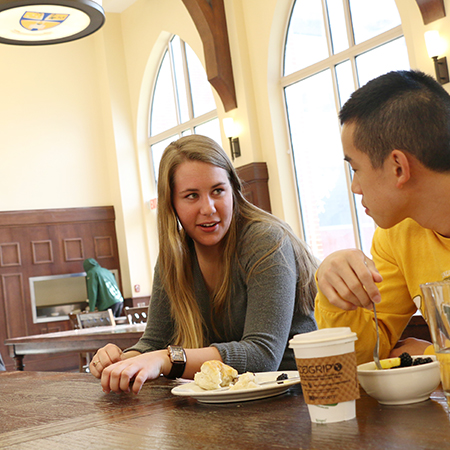The College Life
Melissa McLevain’s day planner might look like that of a busy undergraduate — filled with meetings and events galore.
But McLevain’s activities outside of class are anything but extracurricular. They are an integral part of her experience as a graduate student in the School of Education.
McLevain is in the second year of earning a master’s degree in Higher Education & Student Affairs (HESA) through the Department of Educational Administration. And, like every student in the program, she serves 20 hours a week in a student affairs apprenticeship on campus. HESA students are serving in Greek Life, Multi-Cultural Affairs, Spiritual Life, Student Productions, Campus Visits and others.
As graduate hall director in Brooks Residential College, McLevain lives in Brooks and eats her meals in the cafeteria, so she is truly immersed in college life.
On an autumn Thursday, McLevain’s day began at 8 a.m. with a student meeting and ended at 10:30 p.m., after a Brooks staff meeting to finalize room assignments for the next semester. She tries to attend chapel each day and squeezes in studying wherever possible — on this particular day, it came between the drop-ins from students wanting to discuss room assignments.
At 2 p.m., McLevain headed to class. HESA students take three classes each semester in a cohort model — a group of students starts the program together and takes every class together.
HESA By the Numbers
22 months to complete the program
26 total students: 14 first year and 12 second year
100% job placement for May 2014 grads
30th Anniversary of the program, founded in 1984
“The program is definitely academically rigorous,” McLevain said. “I think the cohort model has made our class discussion much deeper. We are comfortable enough with each other to break down the barriers in a way we might not in a class of 20 people that we don’t know well.”
McLevain is also writing a thesis, developing a model to define factors of interaction between students and faculty-in-residence. The project grew out of previous research with HESA director Dr. Rishi Sriram, who is also Faculty Master of Brooks College, where he lives with his wife and three children.
Sriram, who has been director of the HESA program since 2009, is also a HESA graduate; he completed the program in 2003 before earning a PhD in higher education at Azusa Pacific University.
Sriram said the School of Education’s HESA program has set itself apart by being the only program from a research university that prepares students to understand the integration of faith and learning in addition to theory on college administration and college student development. “We seem to be carving a niche that is drawing a lot of national attention,” he said.
McLevain said Baylor’s focus on faith-based education was indeed a big draw for her. She wants to work in student affairs because college is such a seminal time for so many students — and adding an understanding of faith development made Baylor’s program special. — Meg Cullar
